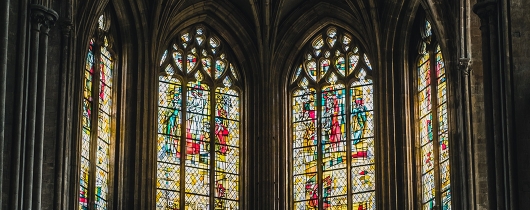Ministry and the Holy Spirit | Ministerio y el Espíritu Santo

Saturday of the 2nd week of Easter
Acts 6:1-7; John 6:16-21
One of the great gifts that God has given the Church is the creative and practical power of the Holy Spirit. This has enabled her to respond to pastoral needs and the signs of the times, both inside and outside the Church.
Our first reading provides an early example. In response to accusations of discrimination against Greek-speaking widows in the daily distribution of food, the apostles create a new ministry: what we have come to know as the diaconate. That ministry continued to evolve and added liturgical roles in addition to those of direct service.
It’s also important to note that Stephen and the others didn’t volunteer. They were discerned, chosen, called, and commissioned for their important work. These all remain important parts of the process of preparing people for ministry today, even as volunteering remains important.
We are blessed to have many permanent deacons and their wives serving the church today. We are also blessed that the transitional diaconate remains part of imbuing those who will be priests with a spirit of humble service. The one who was able to walk on water is still able to turn a problem like discrimination into an opportunity for new growth and service. jc
---------------------------------------------------------------------------------------------------------------
Sábado de la 2ª semana de Pascua
Hechos 6:1-7; Juan 6:16-21
Uno de los grandes dones que Dios ha concedido a la Iglesia es el poder creativo y práctico del Espíritu Santo. Esto le ha permitido responder a las necesidades pastorales y a los signos de los tiempos, tanto dentro como fuera de la Iglesia.
Nuestra primera lectura ofrece un ejemplo temprano. En respuesta a las acusaciones de discriminación contra las viudas de habla griega en la distribución diaria de alimentos, los apóstoles crean un nuevo ministerio: lo que hemos llegado a conocer como el diaconado. Ese ministerio siguió evolucionando y añadió funciones litúrgicas además de las de servicio directo.
También es importante señalar que Esteban y los demás no fueron voluntarios. Fueron discernidos, elegidos, llamados y comisionados para su importante trabajo. Todo esto sigue siendo parte importante del proceso de preparación de las personas para el ministerio hoy en día, incluso cuando el voluntariado sigue siendo importante.
Tenemos la bendición de tener muchos diáconos permanentes y sus esposas sirviendo a la iglesia hoy en día. También tenemos la bendición de que el diaconado transitorio sigue formando parte de la imposición de un espíritu de servicio humilde a los que serán sacerdotes. El que fue capaz de caminar sobre el agua sigue siendo capaz de convertir un problema como la discriminación en una oportunidad para un nuevo crecimiento y servicio. jc




